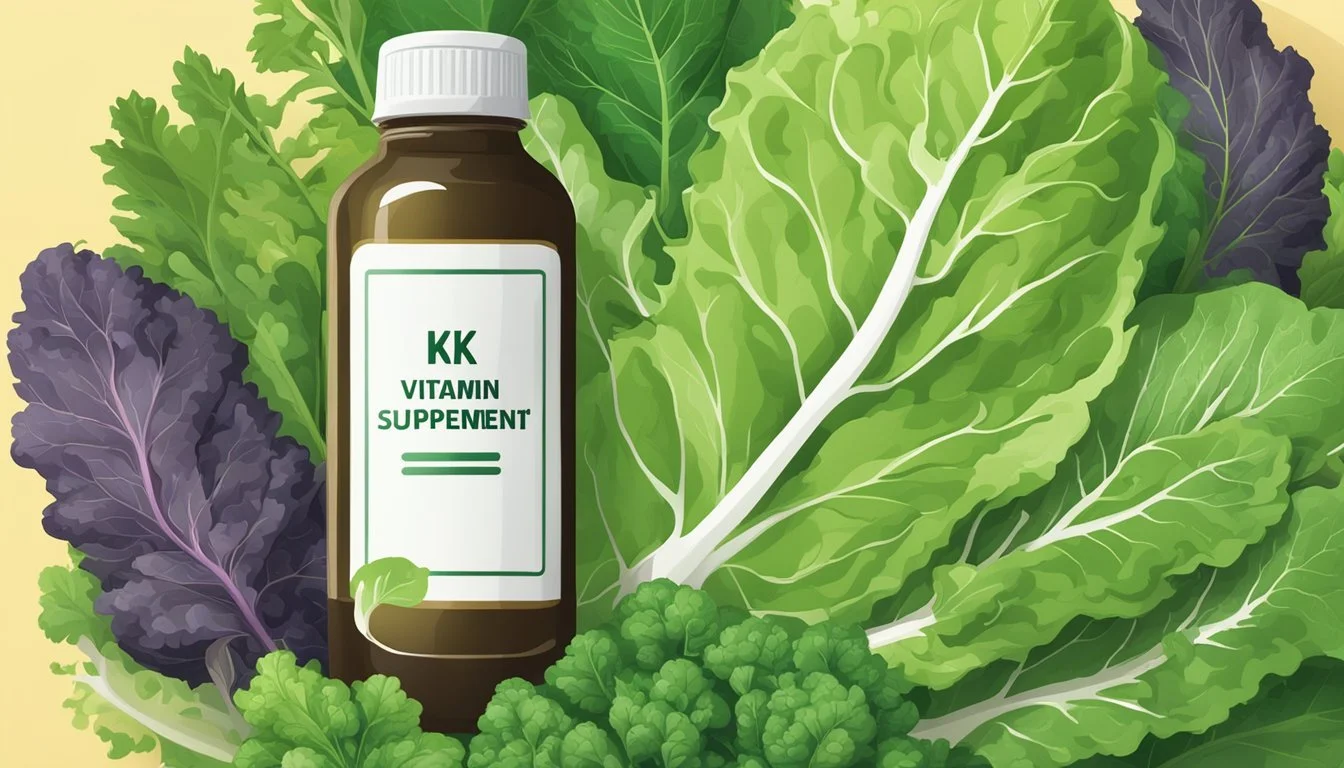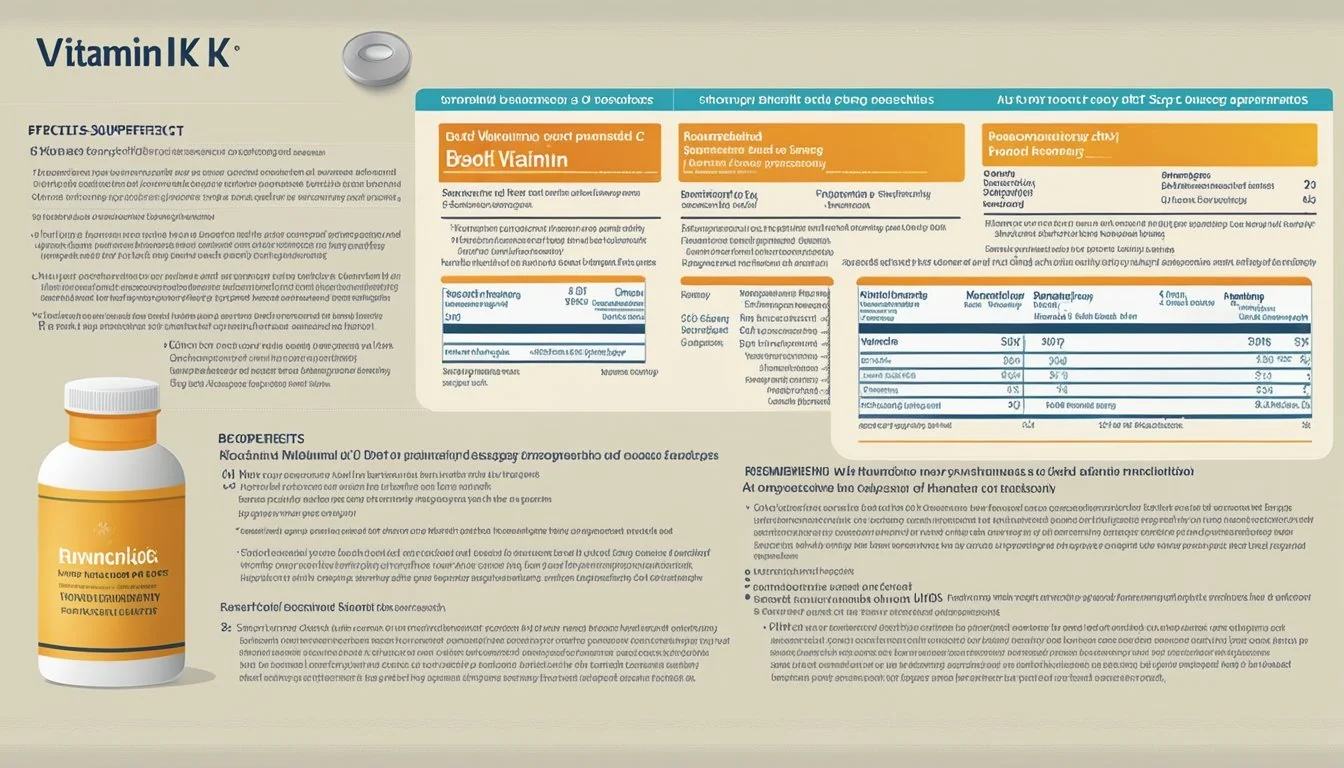Understanding Vitamin K Supplements: Potential Side Effects and Safety Considerations
Vitamin K supplements play a crucial role in blood clotting and bone health. While generally safe when taken as recommended, these supplements can have side effects in certain situations. Rare side effects of vitamin K supplements may include allergic reactions, dizziness, rapid heartbeat, and difficulty breathing.
The FDA regulates vitamin K as a dietary supplement. Most people obtain sufficient vitamin K from their diet, particularly from green leafy vegetables. Supplementation is typically only necessary for individuals with specific medical conditions or those taking certain medications that interfere with vitamin K absorption.
It's important to consult a healthcare provider before starting any new supplement regimen. Vitamin K can interact with blood-thinning medications like warfarin, potentially altering their effectiveness. Pregnant women should avoid vitamin K supplements unless directed by their doctor, as high doses may cause jaundice in newborns.
Understanding Vitamin K
Vitamin K is an essential nutrient that plays crucial roles in blood clotting, bone health, and cardiovascular function. This fat-soluble vitamin exists in multiple forms and can be obtained from various dietary sources.
Importance of Vitamin K in the Body
Vitamin K is vital for blood coagulation, activating proteins that help form blood clots to prevent excessive bleeding. It also supports bone metabolism by regulating calcium absorption and promoting bone mineralization. Vitamin K contributes to vascular health by preventing calcium buildup in arteries.
Recent research suggests potential benefits for insulin sensitivity and brain function. Adequate vitamin K intake may help reduce the risk of osteoporosis, cardiovascular disease, and certain cancers.
Types of Vitamin K: K1 and K2
Vitamin K comes in two main forms: K1 (phylloquinone) and K2 (menaquinone).
K1 is primarily found in plant foods, especially green leafy vegetables. It is the main dietary source of vitamin K for most people.
K2 has several subtypes and is produced by bacteria. It can be found in fermented foods and animal products. K2 may have unique benefits for bone and heart health.
Both forms are important for overall health, but K2 is thought to be more bioavailable and have a longer-lasting effect in the body.
Sources of Vitamin K
Vitamin K1 is abundant in green vegetables such as:
Spinach
Broccoli
Brussels sprouts
Lettuce
Vitamin K2 can be found in:
Natto (fermented soybeans)
Cheese
Egg yolks
Butter from grass-fed cows
Other good sources include:
Pumpkin
Soybeans
Vegetable oils (especially soybean and canola)
The body can also produce some vitamin K2 from K1 through bacterial fermentation in the gut.
Health Benefits of Vitamin K
Vitamin K plays crucial roles in blood clotting, bone health, and cardiovascular function. This essential nutrient supports multiple aspects of human health through its involvement in key physiological processes.
Role in Blood Clotting
Vitamin K is vital for proper blood clotting. It activates several proteins involved in the coagulation cascade, including prothrombin. Without sufficient vitamin K, the body cannot form blood clots effectively.
This clotting function helps prevent excessive bleeding from injuries. Vitamin K's role is so important that newborns often receive a vitamin K injection to prevent bleeding problems.
In adults, adequate vitamin K intake ensures wounds heal properly and reduces the risk of uncontrolled bleeding. It's especially crucial for individuals taking certain medications that may interfere with blood clotting.
Bone Health and Fracture Prevention
Vitamin K contributes significantly to bone health. It activates osteocalcin, a protein that helps bind calcium to bones. This process is essential for maintaining and improving bone mineral density.
Studies suggest that higher vitamin K intake is associated with a reduced risk of osteoporosis and bone fractures. Postmenopausal women and older adults may particularly benefit from ensuring adequate vitamin K consumption.
Vitamin K works synergistically with calcium and vitamin D to support strong bones. It helps optimize calcium absorption and utilization within bone tissue. This interaction highlights the importance of a balanced nutrient intake for skeletal health.
Vitamin K and Cardiovascular Health
Emerging research points to vitamin K's potential benefits for heart health. It may help prevent the calcification of arteries, a process linked to cardiovascular disease.
Vitamin K activates proteins that regulate calcium deposition. This action may help keep calcium in bones and out of arteries, potentially reducing the risk of arterial stiffness.
Some studies suggest that adequate vitamin K intake is associated with a lower risk of heart disease. However, more research is needed to fully understand the extent of vitamin K's cardiovascular benefits.
Regular consumption of vitamin K-rich foods or supplements may support overall heart health as part of a balanced diet and healthy lifestyle.
Vitamin K Deficiency
Vitamin K deficiency can lead to serious health complications, particularly related to blood clotting. This condition affects various populations and may require supplementation for proper management.
Identifying Deficiency Symptoms
Excessive bleeding is the primary sign of vitamin K deficiency. This can manifest as easy bruising, nosebleeds, or prolonged bleeding from cuts. In severe cases, internal bleeding may occur.
Newborns are particularly susceptible to vitamin K deficiency bleeding (VKDB), which can cause life-threatening hemorrhages. VKDB can affect the brain, gastrointestinal tract, or umbilical cord area.
Adults may experience heavy menstrual bleeding or blood in urine or stool. Slow wound healing and weakened bone structure are also potential indicators of deficiency.
Risk Groups for Vitamin K Deficiency
Certain populations face higher risks of vitamin K deficiency. Newborns typically have low vitamin K levels at birth, making them vulnerable to VKDB.
Individuals with malabsorption disorders like cystic fibrosis or celiac disease may struggle to absorb vitamin K effectively. Chronic antibiotic use can disrupt gut bacteria that produce vitamin K.
• People with liver disease • Those on blood thinners • Individuals with eating disorders • Heavy alcohol consumers
These groups may require closer monitoring and potential supplementation to maintain adequate vitamin K levels.
Managing Deficiency with Supplementation
Vitamin K supplements can effectively address deficiency. The two main forms are:
Phylloquinone (K1): Found in plant foods
Menaquinones (K2): Produced by bacteria and found in fermented foods
For most adults, dietary changes can resolve mild deficiency. Leafy greens, broccoli, and Brussels sprouts are excellent K1 sources. Natto (fermented soybeans) provides abundant K2.
Severe deficiency may require oral or injectable supplements under medical supervision. Dosage depends on the individual's condition and needs. Newborns typically receive a vitamin K injection at birth to prevent VKDB.
It's crucial to consult a healthcare provider before starting any supplementation regimen, especially for those on blood-thinning medications.
Side Effects of Vitamin K Supplements
Vitamin K supplements can cause various adverse reactions ranging from mild discomfort to more serious complications. While generally safe when taken as directed, some individuals may experience unwanted effects that require attention.
Common Adverse Reactions
Gastrointestinal issues are among the most frequently reported side effects of vitamin K supplements. Some users experience nausea, vomiting, or stomach discomfort. Dizziness and lightheadedness can occur, especially when standing up quickly from a seated or lying position.
Taste disturbances have been noted in some cases. A small percentage of users report a temporary change in their sense of taste or an unpleasant aftertaste after taking vitamin K supplements.
Headaches are another potential side effect. While usually mild, persistent or severe headaches should be reported to a healthcare provider.
Skin-Related Side Effects
Skin reactions can manifest in various forms after taking vitamin K supplements. Rashes are the most common dermatological side effect. These may appear as red, itchy patches on the skin.
Hives, characterized by raised, itchy welts, can develop in some individuals. This allergic reaction typically requires immediate medical attention.
Flushing or redness of the skin, particularly on the face and neck, has been reported. While often harmless, it can be uncomfortable for some users.
Sweating is another potential skin-related side effect. Excessive perspiration may occur as a response to the supplement.
Serious Complications and Contraindications
Severe allergic reactions, though rare, can occur with vitamin K supplements. Symptoms include swelling of the face, lips, tongue, or throat, difficulty breathing, and rapid heartbeat. These require immediate medical intervention.
Jaundice, characterized by yellowing of the skin and eyes, may indicate liver problems. This side effect is more common in newborns and requires prompt medical attention.
Bleeding disorders can be exacerbated by vitamin K supplements. Individuals on blood thinners should consult their doctor before taking vitamin K, as it may interfere with anticoagulant medications.
Pregnant women should exercise caution. High doses of vitamin K during pregnancy have been linked to jaundice in newborns.
Interactions with Other Nutrients and Medications
Vitamin K can interact significantly with various medications and other nutrients in the body. These interactions can affect the absorption, effectiveness, and safety of both vitamin K and other substances.
Vitamin K and Blood Thinners Like Warfarin
Vitamin K plays a crucial role in blood clotting, which directly opposes the action of blood thinners. Warfarin (Coumadin) is particularly sensitive to vitamin K intake. Patients on warfarin must maintain consistent vitamin K levels in their diet.
Sudden increases in vitamin K can reduce warfarin's effectiveness, potentially leading to dangerous clots. Conversely, decreases in vitamin K intake may enhance warfarin's effects, increasing bleeding risk.
Healthcare providers often recommend patients on warfarin to maintain a steady vitamin K intake rather than avoiding it completely. This approach helps stabilize the medication's effects.
Interactions with Other Vitamins and Minerals
Vitamin K can interact with several other nutrients in complex ways. Vitamin E in high doses may interfere with vitamin K absorption and function. This interaction can potentially increase bleeding risk.
Calcium and vitamin D supplements may enhance vitamin K's bone-building effects. However, excessive calcium intake might interfere with vitamin K absorption.
Vitamin C can affect vitamin K's role in blood clotting. Large doses of vitamin C may reduce the effectiveness of warfarin, indirectly interacting with vitamin K's function.
Magnesium and chromium supplements generally don't have significant interactions with vitamin K. However, it's always best to consult a healthcare provider before combining supplements.
Food and Drug Interactions
Certain foods can significantly impact vitamin K levels and its interactions with medications. Fermented foods like natto contain high levels of vitamin K2, which can strongly interfere with blood thinners.
Green leafy vegetables, rich in vitamin K1, should be consumed consistently for those on blood thinners. Sudden increases or decreases in these foods can disrupt medication effectiveness.
Some antibiotics can reduce vitamin K production by gut bacteria, potentially affecting blood clotting. This effect is more pronounced with long-term antibiotic use.
Aspirin and other blood-thinning medications may increase the risk of bleeding when combined with high vitamin K intake. Patients should inform their healthcare providers about all medications and supplements they're taking.
Eggs and meat contain moderate amounts of vitamin K and generally don't cause significant interactions. However, drastic changes in diet can affect overall vitamin K intake and should be discussed with a healthcare provider.
Recommended Dosage and Safety Precautions
Vitamin K dosage recommendations vary based on age, health status, and specific conditions. Proper intake is crucial for blood clotting and bone health, but caution is needed for certain groups.
Establishing Adequate Intake Levels
The Adequate Intake (AI) for vitamin K is measured in micrograms (mcg) per day. For adults 19 years and older, the AI is 120 mcg for men and 90 mcg for women. Most people get sufficient vitamin K through their diet.
Vitamin K supplements are available in two main forms:
Vitamin K1 (phylloquinone)
Vitamin K2 (menaquinones)
Supplement dosages typically range from 50-1000 mcg. It's important to note that vitamin K is fat-soluble, meaning it's stored in the body's fatty tissues.
Understanding Dosing for Different Populations
Dosage needs vary across different life stages:
Newborns: A single injection of 0.5-1 mg at birth is standard practice to prevent bleeding.
Children: AI increases with age, from 2-2.5 mcg/day for infants to 60-75 mcg/day for teenagers.
Pregnancy and breastfeeding: AI remains at 90 mcg/day, but consult a healthcare provider before supplementing.
Certain medical conditions may require adjusted dosages. Patients on blood thinners need careful monitoring of vitamin K intake to maintain stable anticoagulation.
Precautions for Special Conditions
People with certain health conditions should exercise caution:
Kidney disease: May affect vitamin K metabolism; dosage adjustments might be necessary.
Liver disease: Can impair vitamin K absorption and utilization.
Potential interactions:
Anticoagulants (e.g., warfarin)
Antibiotics
Bile acid sequestrants
Always consult a healthcare professional before starting any new supplement regimen, especially for those with pre-existing conditions or taking medications.
Pediatric use of vitamin K supplements should be under strict medical supervision. Overdosing is rare but can lead to complications, particularly in newborns.
Vitamin K Supplements and Lifestyle Considerations
Vitamin K intake involves a complex interplay between diet, supplementation, and lifestyle factors. Proper management requires understanding how these elements work together to support optimal health.
Balancing Supplementation with Diet
Vitamin K occurs naturally in many foods, particularly green leafy vegetables. Kale, spinach, and collard greens are excellent sources. Other vegetables like broccoli and Brussels sprouts also contain significant amounts.
Plant-based oils, especially soybean and canola oil, provide vitamin K as well. Some fruits, such as blueberries and figs, contain small amounts.
Supplements can fill dietary gaps but should not replace a balanced diet. Most people obtain sufficient vitamin K through food alone. Consult a healthcare provider before starting supplements, especially if taking blood thinners.
Role of Gut Bacteria in Vitamin K Synthesis
The human gut microbiome plays a crucial role in vitamin K production. Certain bacteria in the large intestine synthesize vitamin K2, contributing to overall vitamin K status.
A healthy, diverse gut microbiome supports optimal vitamin K synthesis. Consuming prebiotic and probiotic foods can promote beneficial gut bacteria. Fermented foods like yogurt, kefir, and sauerkraut may be particularly helpful.
Antibiotics can disrupt gut bacteria, potentially affecting vitamin K production. Those on long-term antibiotic treatment may need to monitor their vitamin K status more closely.
Influence of Lifestyle on Vitamin K Needs
Various lifestyle factors can impact vitamin K requirements and absorption. Regular exercise may increase vitamin K needs due to its effects on bone metabolism.
Alcohol consumption can interfere with vitamin K absorption and metabolism. Heavy drinkers may be at higher risk of vitamin K deficiency.
Certain medical conditions, such as short bowel syndrome or cystic fibrosis, can impair vitamin K absorption. Individuals with these conditions may require supplementation under medical supervision.
Smoking has been associated with lower vitamin K levels. Quitting smoking and maintaining a healthy lifestyle can support optimal vitamin K status.






